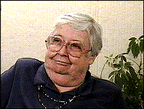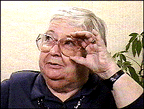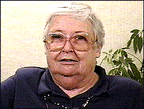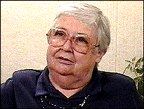![]() Listen
to Nancy share a cancer experience in her own words. (672 K .au
file)
Listen
to Nancy share a cancer experience in her own words. (672 K .au
file)

Nancy was 66 years old when she was diagnosed with breast cancer. She was working overseas and returned home because of health problems. The cancer was discovered while checking out those health complaints.

Nancy's cancer was discovered while she was undergoing tests for unrelated complaints. In fact, it wasn't until far into the cancer treatment and recovery that she remembered to address the original health complaints.

Nancy decided to have a lumpectomy followed by radiation. She is also taking Tamoxifen.

Nancy was not looking forward to a long recuperation. She was eager to get back to her professional life. However, this experience made her slow down and take a look at her world.
Nancy's Introduction: It was harder on my husband
Many of my own family have died of cancer, so it was not
frightening to me and not shocking. I think it was much, much harder
on my husband who has always felt that he would disappear and I would
be left to pick up all the pieces. And suddenly he had to face the
fact that maybe that wasn't going to be the way it was. So, it was
mostly getting the kids to cheer him along, I think as much as
anything. If you've been through a lot of hospitalization or
children's illnesses as we have, then this is a piece of cake
compared to those kinds of things.
Nancy's Introduction: I was successful but stressed
I had my most productive work in 1990. The most money, the most
opportunity at age 65. It has taken me all that time to finally to
get to that professional level. And the next year was very difficult
because we were in India during the Gulf War, and India was not
sympathetic with the United States' position during the Gulf War. It
was a very tense time to be there. We moved back in June, I made two
more trips to South Asia and carried a virus with me most of the
time. So a lot of stuff just added up. I just had no reserves at all.
In fact, one would reflect on how much my immune system had just
given up along the way, which is why the breast cancer showed in the
first place.
Nancy's Introduction: Friends around the world
This older son who is in Arizona, has been supportive from afar.
Our younger son, we were fortunate that he could come home and stay
with his father, and hold his father's hand during surgery, and his
wife is a doctor. You don't have an awful lot of friends when you run
around the world, but the ones that I have had here have been really
very wonderful. And friends from afar, really marvelous to live for
the era when (from places where you didn't use to be able to talk on
the phone and still can't very easily), you can often get FAX, or as
we did last night from this friend in Australia, an E-mail. That
linkages, I have been impressed with. How strong they are around the
world.
Nancy's Introduction: I believe in facing things
I'm a great believer in facing things directly and getting as much
information as you can, not hiding it back in some corner. Because I
think the more information you get, the more able you are to really
help yourself and others.
Nancy's Introduction: My daughter had a lumpectomy
I have two daughters. The older one is 45 and she called me this
spring and said "Mother, can you come down? I am going to have a
lumpectomy this week." So of course, I went steaming down. They would
never, I think, have done a lumpectomy, they would have just done a
simpler procedure if it hadn't been my history. And hereafter, her
surgeon said well, she'll try draining it first because it probably
is just going to be more of the same.
Nancy's Introduction: I knew women with breast cancer
When I was very young, the neighbor across the street ... had a
little child die of cancer, and it was such a shock to me. How could
she have let things get to that stage where that would have happened?
Then I had a very good friend who had breast cancer and had a
mastectomy because that was the obvious way to handle that. And I can
remember to this day when she called five years later to say she had
just been cleared and clean, and she died ... Well, I think what you
know is once you have it, you always have it, and all you can do is
continually see the doctors and eat fiber and don't eat fat. You need
exercise, eat vegetables, whatever it takes to give yourself a
chance.
Nancy's Introduction: Estrogen wasn't the reason
I had a hysterectomy when I was 40 for two reasons. The second
child was born with heredity disease. I had two children after that,
and I had fibroid tumors. So I had a hysterectomy and at that stage,
people were not recommending hormone kinds of therapy. And
interesting enough, it was after I came back from India. Its my
arthritis doctor who, of course, is worrying about hormones because
of the osteoporosis. She put me on estrogen. Well clearly, that's not
the reason that I had breast cancer, but that's the only time I took
it, was about the last four months before I had surgery.
Nancy's Introduction: My husband surprised me
I never would have believed, never would have dreamed. He just
took such good care of me. I mean, we had a visiting nurse who came
for the first week because of the drainage from the lymph node
business is a problem, but he would just spoil me rotten. I don't
mind. It was a surprise, though I'll tell you.
![]() Return
to Nancy's Outline
Return
to Nancy's Outline
Nancy's Diagnosis: The lumpectomy was simple but...
The surgeon, she did the lumpectomy one Monday and when she came
out of that she said "We're scheduled the next Monday for the nodes."
Just like that. Actually, the surgeon reserved time in that hospital
every week so she can deal with people like me who come wandering in
and need surgery right away. But their mammogram machine wasn't
working to mark the place for the surgery, so we dashed something
over top of me and tear across town, back to the place where I had my
original mammogram and they got a doctor in from across the street
hospital to check it out and get it ready, and then we raced back
across. But you know, then you're home in the afternoon and it was
really very, in fact, (almost to my family disappointingly) a simple
arrangement, because I was hungry by evening and they were not
willing to feed me. Finally I said "I'm hungry." So it really was
simple, but of course, it was malignant and so then a week later I
went in for the lymph nodes.
Nancy's Diagnosis: I had lymph nodes removed
I went in for the lymph node under-the-arm business. That was an
overnight at the hospital, which you can't complain about going into
the hospital at 10:00 in the morning and coming home the next day at
10:00 in the morning. I guess I wasn't as prepared for the long term
adjustment to the arm problems. I had a lot of mobility in my arm
from the very beginning, so the exercises that they gave me at the
hospital were just easy. But I can tell you even now, I know that its
happened. So while they've improved cancer surgery with lumpectomy's,
when they could figure out some way to tell how much its spread
without having to take your lymph nodes, it will be even better.
Nancy's Diagnosis: The long-term effects are a drag
I had read recently that they're looking for some other
alternatives than nodes, which they certainly need because that's a
drag. Just a drag, and the fact that my arm is never going to feel
the same again. Plus, its a drag to be sure that I am wearing
something that reminds people that they can't touch this arm if
anything happens to me. Although I have met women in many other
countries in the world wearing bracelets, too, which say "Keep Off."
So we have a new sorority.
Nancy's Diagnosis: I changed radiologists
Then we met separately with each of the specialists: the surgeon,
the radiologist, the oncologist, and the pathologist. And then they
came back and said well, this is what we think should happen. The
radiologist who was assigned to my case clearly was not comfortable,
whether its with me or with breasts, or with what, I don't know. But,
my husband was in the room, too and when the radiologist left the
room, I said to George, "You know, he didn't even look me in the eye
once." It was obvious that he was not at ease. George mentioned this
to the surgeon then and she said "Well, we'll just change." And we
did. Someone else was assigned, who has been terrific. I just have
enjoyed him so much because he has a wonderful sense of humor and
keeps me up through it all.
Nancy's Diagnosis: I knew to get a second opinion
Medical people are so careful nowadays not to tell you what you
should do. Its almost ironic, if you've lived as long as I have, and
lived with one child who was born ill and I was never even given any
alternatives. What he told me was that child would die and you might
just as well let him. And of course, he's still alive today, so I
know that doctor was wrong. It's just the opposite these days. "Well,
we won't tell you. You ought to do this... but here are the
alternatives that you can consider." At that point, I called the
National Cancer Institute and got all the latest research on Stage
One cancer. And this same son who 40 years ago we were busy keeping
alive, now heads a medical program in Arizona. So I faxed all the
diagnostic stuff that I had. Well then, what you get back is answers.
Then the nurse practitioner at the breast clinic was very helpful,
and she said "Would you like a second opinion?" And I said, "Yes, we
really would." And she was smart and moved us over to a very senior
person.
Nancy's Diagnosis: "Radiation is no pussycat"
What you learn is that each specialist is pushing their own bag.
The oncologist is saying, radiation is no pussycat. And we reminded
ourselves of that many times through the next few months, because he
was absolutely right. It was not. But I decided I'd rather go through
that than to look back on it and say well I could have taken the time
off work and done it and I didn't. And certainly, radiation, (the
process I mean), I found it just very challenging and exciting.
![]() Return
to Nancy's Outline
Return
to Nancy's Outline
Nancy's Treatment: I was frustrated during radiation
For me, it was a matter of going every day to the hospital,
getting undressed to a point where you could get on the table and
they would use a laser light which marked the very spot where the
radiation needed to hit. Forty-five seconds and you're done. So
except for the fact that it interrupts every single day, the very
process is very minor. In fact, I suppose that's why it's frustrating
that it, in my case, really knocked me out. It was such a little
thing. Some of the other people are women who actually seem to come
in from the office and just go and plop down and get their 45 seconds
and go back. I was just depressed, I suppose, by the fact that by the
second week I really was not doing much of anything at home. The
truth of the matter is, of course, I didn't have to, and I suppose
that may be part of the thing.
Nancy's Treatment: I wasn't worried about tamoxifen
Well, Tamoxifen . . . my arthritis doctor was so thrilled with it
because it tends to dense up the bones, she thinks, and certainly
it's not going to be negative in that. And I guess the risks with
that are cancer elsewhere and I'm already kind of resigned to that. I
mean, it will not shock me to have cancer again. It never would have,
just basically . . . Tamoxifen. If they think it will help, I'll try
it and see.
Nancy's Treatment: I didn't want a placebo
Having been at a university for 45 years, we've always been very
supportive of research. And certainly when our son was diagnosed and
we were asked to be part of a research program, we were glad to be
because there was very little known and we felt whatever we learned,
we were going to benefit. But when it came down to whether I would
take Tamoxifen or placebo, I just simply couldn't buy into that. I
said either I need it, or I don't need it. And at this stage in my
life, I am not willing to be the guinea pig. We got into a big
philosophical discussion about the basis for medical research, in a
family who already had a lot of social science researchers. Medical
research has come out of veterinary medicine, and they control. In
social science, you don't control in that kind of way. You look at
who has and who hasn't, who did and who didn't, and then you try to
learn from that. I'm convinced that medical research has got to move
in that direction and quit using people as guinea pigs.
Nancy's Treatment: I did not want chemotherapy
I have a very weird stomach and I have seen too many people whose
quality of life went down the drain with chemo. I guess I've not had
the opportunity to see a positive response to it, and that I guess
you probably need to do to be convinced that it's worth doing.
Certainly, if I were 20 years younger, I would not hesitate, but I
mean, I think that's the price you pay for trying to survive at that
point. Although, my sense is the oncologists never want to give up.
In fact, the oncologist push the chemo, and the radiologists push the
radiation. That's the specialty, that's what you expect of the pitch
I suppose.
Nancy's Treatment: Different doctors helped differently
My oncologist, I must say he's a gruffly old bear, but I love him.
Because he's our age an he just knew how to lay things out and
finally I said to him, "Well you know, if it were your wife, what
would you do?" Because I was damned tired of them telling me I could
make up my mind. And it was a young woman oncologist who really made
the first recommendation. So I find so much support from the young
women doctors, and appreciate so much their expertise, but
occasionally, I don't mind having a man who really knows what he's
doing either. So it's not strictly a gender issue, I guess in that
sense because I'm sure different people react differently to each
other in how you end up with a happy, supportive team.
![]() Return
to Nancy's Outline
Return
to Nancy's Outline
Nancy's Recovery: My husband surprised me
My husband is a very workaholic professional, and so I never would
have expected that he would turn out to be a wonderful nurse. But he
took very good care of me, and I just rested. I was very grateful it
was in the summer because I'm a baseball addict, and I had baseball
games to watch all the time. By the fourth week, nobody would really
even ask me what I wanted to eat because I would make up my mind. I
just would go to the hospital, in fact, I drove myself I think
probably the first five weeks to the hospital. And after that, I
think he didn't really trust me to do that either.
Nancy's Recovery: I was a reluctant couch potato
When I was leaving work in South Asia, people who knew me said to
me, "What are you going to do?" I said "I'm going home and be a couch
potato." Little did I know that's actually what I ended up doing. I
just kind of vegetated. Then, when the radiation ended, just as I had
predicted, nobody was begging me to come back to work. And I, to be
honest, didn't have the stamina, but I was really frustrated by the
fact that nobody was begging either. I appreciated so much the
support from my friends here. But even as much, my friends in other
parts of the world, who I'm sure thought I was going to die tomorrow.
But nonetheless, they were going to cheer me on while I was still
here. And maybe in the process of my going through this, they have
learned that it is something you can survive if you're lucky enough
to find it soon enough.
Nancy's Recovery: Follow-up is important
I think the follow-up after radiation is important, and I have
certainly appreciated the fact that I have seen my radiologist every
six months and had a mammogram on that breast every six months, and
that's been very reassuring. I also see the surgeon's office every
six months, and I also see the oncologist every six months. And for a
person who wasn't used to seeing medical people at all, its gotten to
be kind of a drag.
Nancy's Recovery: I had to sort out my world
Some months after the radiation, I was having still real trouble
swallowing and eating very much. They ran a thing own through my
throat to be sure that the esophagus had not constricted from the
radiation, which I think is a fairly common problem. If that was the
problem, I don't have it any more, frankly eating was the problem
that brought me home from India in the winter of '91. And it was only
like about six months after the radiation and everything when I began
putting things on my computer and trying to sort out what it was that
I was dealing with. I had to sort out my world. We hadn't yet
addressed the problem that had gotten me started at the doctor in the
first place, so we went back to do that. I think over the years that
was just from too much Indian food, which we never really addressed
along the way.
Nancy's Recovery: Who wants to live forever?
I don't have any trouble with mortality. I really don't. In fact,
I can't think of anything worse than living forever. I'm dealing much
more with the arthritis than I am with the cancer, because the cancer
I think either its going to sit there sleeping or else its going to
finish me off rather quickly, which I much prefer to this daily dying
by an inch with the arthritis. And the other thing is high
cholesterol, which I've always had because I grew up on a dairy farm
and nobody in my family dies of heart attacks, they all die of
cancer. So finally, I said to my oldest of the present crew of
doctors, I just got this cancer so you should get off my cholesterol
case. I'm tired of hearing about that.
Nancy's Recovery: I'm greedy
Oh now, two years later I'm back almost to normal. I started work
by traveling to Ghana, scared to death about whether I could really
work full days and go full pace. I spent six days in the field in
Ghana, which damned near killed me. Then we went to Latin America for
two weeks, came home from that feeling not good because I got a sinus
infection. How old do you have to get before you're ready to say
you've traveled enough? I'm greedy. I'm greedy for the work. I think
that's part of the price you pay of taking 15 years off in the middle
to have kids and not do anything. And its only when my kids were
finally in high school that I could finally say well I can go off and
do what I really want to do. It's the truth of the matter, I'm
greedy.
Nancy's Recovery: Make up your mind to survive
I think the emphasis on surviving is so important, especially if
you start out at my age. There was a time when anybody who had
cancer, it was just a matter of days, or weeks, or months until they
died. Now, the survival fittest has replaced that, and I'm convinced
the law of what you do and how you come out is basically your own
attitude. If you made up your mind life's worth living and you're
going to try to survive, you've got a heck of a lot better chance
than if you just sit down and give up.
![]() Return
to Nancy's Outline
Return
to Nancy's Outline